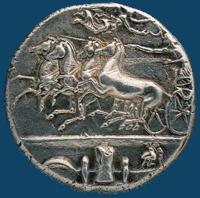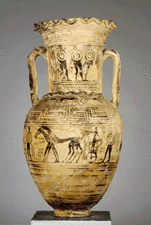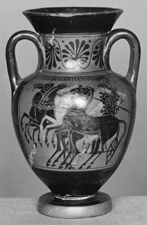The Ancient Greek
World
Use of
Chariots

Silver Decadrachm
ca. 400&endash;375 BC
Syracuse
29-126-41
Racing four-horse chariot with a flying Nike personifying Victory
crowning the driver. The space below is filled with captured Punic
arms. This spectacular coin may commemorate the victory of Dionysius
I over the Carthaginian general Himilcon and the deliverance of
Syracuse from its Punic siege in 396 BC The reverse of the coin is
signed by Euaenetus, one of the most renowned coin designers of
antiquity. Commemorative types became especially popular in the
Hellenistic period after Alexander´s death in 323 BC
Dia. 34.0 mm. Photo courtesy Public Information Office, Univ. of
Pennsylvania Museum

Attic Geometric Amphora
Late Geometric IIb (ca. 720&endash;700 BC)
30-33-133
The upper two panels depict lines of armed soldiers three abreast,
while the lowest register shows a procession of chariots and armed
soldiers.
H. 52.0; Dia. 25.0 cm. Photo by Maria Daniels for the Perseus Project
(larger
version)

Attic Black Figure Amphora
Early 5th century BC
By the Diosphos Painter
On loan, Philadelphia Museum of Art
L-64-177
The goddess Athena driving a four-horse chariot or quadriga.
H. 18.8; Dia. 12.0 cm. UM neg. S8-2828 (larger
version)


The Ancient Greek World Index



